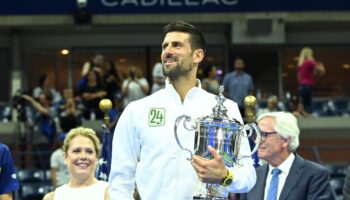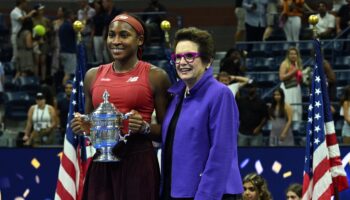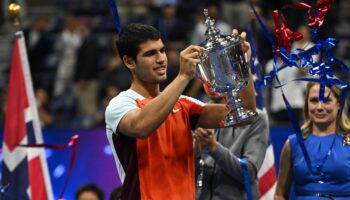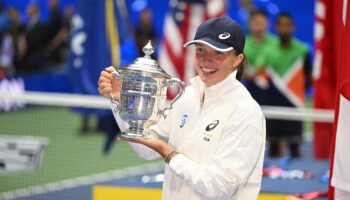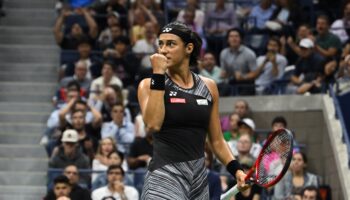 – by Adesina O. Koiki
– by Adesina O. Koiki
A Lot of Sports Talk editor-in-chief
Follow @Koiki_Sport
With the last bits of energy he could muster before walking off of Melbourne Arena on Sunday afternoon, unseeded American Frances Tiafoe, who minutes earlier topped off proceedings during his 21st birthday by earning his first-ever quarterfinal appearance at a major tournament, was handed a Sharpie in the post-match, autograph-the-clear-lens exercise that has become as much of tennis tradition as wearing white at Wimbledon. Instead of providing his John Hancock, Tiafoe left a message for hordes of tennis fans from the Pacific Rim to the Capital Beltway to absorb.
BE THE EXAMPLE.
Tiafoe, as well as another unseeded American, Danielle Collins, have continued to set the example for the future of American tennis by becoming indelible marks on the present during this year’s Australian Open, as both have made surprising runs to the quarterfinals. It is only the third time since 2000 that an unseeded American man and woman reached the quarterfinals of the same major, with the last occurrence coming at the 2007 Australian Open when Mardy Fish and Serena Williams pulled it off. (Serena went on to win the event.) Excluding that 2007 Aussie Open, when Williams had dropped in the rankings due to an injury-plagued 2006, you would have to go back to the 2000 Wimbledon Championships (Lisa Raymond, Jan-Michael Gambill) for the last instance of unseeded American glory in the final eight of a major in both singles’ draws.
It is literally a dream come true for Tiafoe, who defeated No. 20 Grigor Dimitrov in four grueling sets in the round of 16, whose parents emigrated from war-ravaged Sierra Leone and were granted two of the approximately 55,000 visas allocated in 1996 through the diversity visa program. His father soon joined a construction crew working on the Junior Tennis Champions Center (JTCC), an expansive multi-court tennis facility located in College Park, Md., just 30 minutes northeast of Washington, DC. With finances stretched in the household as Frances’ mother worked as a nurse while living with relatives in a one-bedroom flat, her husband eventually took up residence in the building with Frances and his younger brother, Franklin.
His father’s work at the country club allowed Frances to become a member at the expensive club for free, and as his talent and legend grew, so did the line of sponsors hoping to help his burgeoning career.
All of that was not lost on Tiafoe when explaining what being able to make a run in a Grand Slam means to him.
“Obviously, if you guys know anything about me, the story in tennis, I obviously wasn’t a normal tennis story,” Tiafoe said after his win against Dimitrov. “The beginning of my career, I was playing for [my parents], trying to do everything for my family. Obviously now I put them in a great place. Now I’m trying to do it for me.”
Believing that then 8-year-old Frances was starting to get a little spoiled at the tennis club for questioning why he was playing in hand-me-down clothing while others at the club could afford more tennis-appropriate apparel, his father had Frances and his brother accompany their mother to Sierra Leone so Frances could see the country — and the disrepair — his parents left. Humility set in quickly for young Frances, who was able to go back to the academy with a clearer focus once the family landed back on US soil.
“My academy, a ton of wealthy guys. You got cats rolling in there with chauffeurs, all that,” Tiafoe said about some of what he saw at JTCC. “I’m not saying you can’t make it if you grew up from a wealthy situation, I mean, a ton of people have. But obviously that gave me an incentive, a reason to give, a reason to work every day, understand why you do it.”
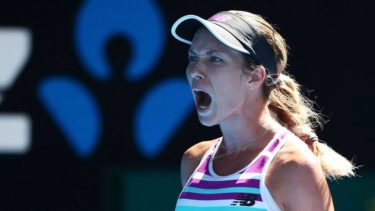
During the on-court interview after the win against Dimitrov, there was more than just severe cramps that ended up hitting Tiafoe hard at the end of the match.
“It means the world. I worked my ass off, man,” a tearful Tiafoe said. “I told my parents 10 years ago I was going to be a pro, I was going to change their lives and my life and now I’m in the quarters of a Slam. I can’t believe it.”
While Collins’ family grew up in much more of a tennis hotbed, St. Petersburg, Fla., the country-club life of many an American youth tennis player who eventually turns professional eluded her. When Collins first made a name for herself as a pro, making it to the semifinals in Miami last year as a qualifier, she defeated Venus Williams, one of her tennis idols due to the similarities of how both she and Serena Williams learned the game to Collins’ own rearing in the sport.
“Growing up, watching so many of their matches, I could really relate to them, to their upbringing,” Collins said last year in Miami. “I didn’t have an easy upbringing. I didn’t come from a super wealthy family. I wasn’t at the country club every day, playing in camps with the other kids.”
As her dad, 81-year-old Walter, worked as a landscaper, Collins honed her game on the public courts near St. Petersburg, essentially playing pick-up games with anyone who accepted her invitation to trade groundstrokes with her.
“The Williams sisters went through something similar, and that really resonates with me,” Collins said. “When you’re little and have to go up to people and ask, ‘Hey, will you hit some balls with me?,’ it makes you a little adult, it makes you grow up. Even at a young age I was pretty mature.”
That upbringing also brought her an unmistakable edge, a competitive fire that becomes almost uncontrollably incandescent during every match. It helped her win two NCAA championships while at the University of Virginia (2014, 2016), and her trademark “Come on!” exclamations continue to register at high decibel levels with every match played — and won — in Melbourne. After her 6-0, 6-2 demolition of 2016 Australian Open champion Angelique Kerber in the Round of 16 on Sunday, many in the Margaret Court Arena crowd who are not well-versed with Collins’ personality probably expected to hear some mixture of humility, excitement and surprise in her voice during her on-court interview.
What they got were parts of the interview that bordered on hubris.
“I may not have won a Grand Slam match before this week,” Collins, 25, said on-court after defeating Kerber, “but I gotta tell you, I think it’s gonna keep happening.”
Her on-court demeanor, she admits, can be abrasive, and opponents might end up using it as motivation in their attempt to throw Collins’ fire back in her face.
Bring it on, Collins says.
“If somebody wants to get in my face on my unforced errors, I have no problem getting right back at them and making it a feisty match,” said Collins. “I love that, embrace it. I love when things get competitive. Whether people are for me or against me, I’m not really fazed by it. I kind of like it more when people cheer against me because I want to prove them wrong.”
What Collins and Tiafoe are proving during the fortnight is that they are going to be the examples that the future of American tennis will soon emulate.
